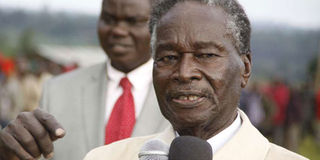An unkind word from Biwott would cause a politician or civil servant sleepless nights

National Vision Party leader Nicholas Biwott addresses a function in Ainabkoi, Uasin Gishu County, on August 13, 2016. Biwott point men were powerful personalities in their political, public or parastatal offices. PHOTO | JARED NYATAYA | NATION MEDIA GROUP
What you need to know:
- Biwott was a member of the Kenyan delegation to the Commonwealth Heads of Government Meeting in Auckland.
- A dismissive wave of the hand would stop an approaching person dead in their tracks.
Kipyator Nicholas Kiprono arap Biwott was a small, short and inscrutable man blessed with a big brain.
He said little in public, gave away even less, seldom raised his voice and smiled only fleetingly.
For over two decades, he wielded immense power and had a larger-than-life profile in Kenya’s political arena.
BARON
Through the 1990s, I characterised him as the power man (baron) of President Moi’s era; Ugenya MP James Orengo nicknamed him the Bull of Auckland in 1995; political foes and friends alike called him Prime Minister; and, in 1995, Biwott called himself a “total man”.
Why the Bull of Auckland?
Biwott was a member of the Kenyan delegation to the Commonwealth Heads of Government Meeting in Auckland in New Zealand, but he was sent home before it concluded.
TOTAL MAN
He was expelled because he exposed himself to a chambermaid in his hotel.
An irascible Biwott, sacked from the Cabinet four years earlier over allegations of murder, oft-chastened over sexual abuse, would explode in a tautological rant in Parliament.
He told the House he would not be intimidated because he was “a man, a real man, a total man”.
Total Man became his favourite nickname.
POWER PLAYER
Biwott may have had in mind the traditional manly attributes of himself fervently providing for his three wives and children and protecting them, building a business empire, and fiercely fighting in his political corner.
But many thought he was boasting about his immense wealth and power.
A power player and puppet master, Biwott’s influence was thought to pervade every corner of Kenya and tentacles of the ruling party and government.
HORRIBLE YEAR
Men of power attract admiration and antipathy, friends and foes as well as ups and downs and 1990 was Biwott’s annus horribilis.
After a long investigation, British policeman John Troon told a commission of inquiry that Biwott and Oyugi were the principal suspects in Dr Robert Ouko’s murder.
Troon appeared to have confirmed what rumour mills had been churning out for 10 months.
OUKO MURDER
Oyugi was the Permanent Secretary in charge of Internal Security when Ouko mysteriously disappeared only for his burnt body to be found near his rural home.
Oyugi was regarded as the epitome of Biwott’s creations; plucked from inconspicuousness and propelled to the pinnacle of the dreaded security system that was, by and large, created and beholden to Biwott.
Biwott point men were powerful personalities in their political, public or parastatal offices.
DEALS
Oyugi was nicknamed variously as Governor and Kalamu Madwong’ (the Big Pen).
In colonial Kenya the Governor represented Her Majesty’s Government.
Oyugi’s signature (or good word) was an “open Sesame” password to business deals with government agencies or connections with the movers and shakers.
FAILED COUP
In the days immediately after Moi took the reins of power in 1978, Kenyatta cabinet holdovers Charles Njonjo and GG Kariuki would occasionally hitch a lift in the presidential limousine, giving rise to talk of a collegiate presidency.
The failed coup of 1982 put an end to all that camaraderie and perceived sharing of power.
Moi set out to be his own man, crafting his own path, peopled by his own men carrying out his agenda.
SINGLE PARTY
Parliament, in a record 45 minutes, changed the Constitution and turned Kenya into a de jure (by law) single party state.
The stage was set for the Moi legacy and, in it, Biwott’s as the man who would tell Kanu and government what to think.
But Biwott’s status and rising star were evident even before the failed coup.
HERDER
As Minister of State in the President’s Office, he was in charge of Cabinet Affairs, Lands and Settlement, Immigration and Science and Technology!
Biwott was only 39, Moi was 55, Njonjo 59 and GG nine years his senior.
The young man who used to herd the family livestock learned how to buy and sell merchandise with a view to making a profit at the feet of his fruit and vegetable vendor father; tried his hand at journalism; and the one time untrained teacher, was the new kid on the political, cabinet and influence-peddling blocks.
FEAR
Even fear would have feared single party era Biwott.
An unkind word from him would cause a politician, civil servant or businessman endless sleepless nights.
A dismissive wave of the hand would stop an approaching person dead in their tracks. A rebuke sent many to pieces.
Something else Biwott said when he called himself a total man has come to pass: “I will die a man in this country.”
Opanga is a commentator with a bias for politics [email protected]





